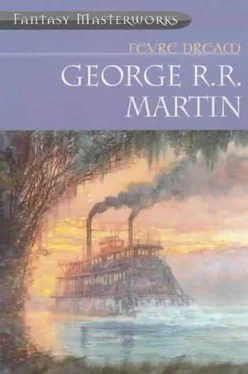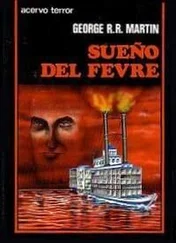George Martin - Fevre Dream
Здесь есть возможность читать онлайн «George Martin - Fevre Dream» весь текст электронной книги совершенно бесплатно (целиком полную версию без сокращений). В некоторых случаях можно слушать аудио, скачать через торрент в формате fb2 и присутствует краткое содержание. Жанр: Фэнтези, на английском языке. Описание произведения, (предисловие) а так же отзывы посетителей доступны на портале библиотеки ЛибКат.
- Название:Fevre Dream
- Автор:
- Жанр:
- Год:неизвестен
- ISBN:нет данных
- Рейтинг книги:4 / 5. Голосов: 1
-
Избранное:Добавить в избранное
- Отзывы:
-
Ваша оценка:
- 80
- 1
- 2
- 3
- 4
- 5
Fevre Dream: краткое содержание, описание и аннотация
Предлагаем к чтению аннотацию, описание, краткое содержание или предисловие (зависит от того, что написал сам автор книги «Fevre Dream»). Если вы не нашли необходимую информацию о книге — напишите в комментариях, мы постараемся отыскать её.
Fevre Dream — читать онлайн бесплатно полную книгу (весь текст) целиком
Ниже представлен текст книги, разбитый по страницам. Система сохранения места последней прочитанной страницы, позволяет с удобством читать онлайн бесплатно книгу «Fevre Dream», без необходимости каждый раз заново искать на чём Вы остановились. Поставьте закладку, и сможете в любой момент перейти на страницу, на которой закончили чтение.
Интервал:
Закладка:
How much time passed I cannot say. But finally Simon looked down, and it was over. Then he did something startling and strange. He knelt before me, and bit open a vein in his own wrist so the blood flowed out, and held it up to me in submission. “Bloodmaster,” he said in French.
The flowing blood, so close at hand, woke a dryness in my throat. I reached out and grabbed his arm, trembling, and began to bend toward it. And then I remembered. I slapped him and spun away, and the bottle was on the table by the hearth. I poured two glasses, drained one and thrust the other at him while he looked on, uncomprehending. “Drink,” I commanded him, and he did as he was told. I was bloodmaster, and my word was law.
That was the beginning, there in the Carpathians in 1826.
Simon had been one of my father’s two followers, as I had known. My father had been bloodmaster. With his death, Simon led, being stronger than the other. He brought me to the place he lived the following night, a snug chamber buried in the ruins of an old mountain fortress. There I met the others; a woman whom I recognized as the other servant of my childhood, and two more of my people, whom you call Smith and Brown. Simon had been their master. Now I was. More, I brought with me freedom from the red thirst.
So we drank, and passed many nights, while from their lips I began to learn the history and ways of the people of the night.
We are an old people, Abner. Long before your race raised its cities in the hot south, my ancestors swept through the dark winters of northern Europe, hunting. Our tales say we came from the Urals, or perhaps the steppes, spreading west and south through the centuries. We lived in Poland long before the Poles, prowled German forests before the coming of the Germanic barbarians, held sway over Russia before the Tartars, before Novgorod-the-Great. When I say old, I do not speak of hundreds of years, but of thousands. Millennia passed in the cold and the darkness. We were savage, the stories say, cunning naked animals, one with the night, swift and deadly and free. Long-lived beyond all other beasts, impossible to kill, the masters and lords of creation. So our stories go. All that walked on two legs or four, ran in fear of us. All that lived was but food for us. By day we slept in caves, packs of us, families. By night we ruled the earth.
Then, up from the south, your race came into our world. The day people, so like us and yet so unlike. You were weak. We killed you easily, and took joy in it, for we found beauty in you, and always my people had been drawn to beauty. Perhaps it was your likeness to us we found so captivating. For centuries you were simply our prey.
But changes came with time. My race was very long-lived, but few in number. The mating urge is curiously absent in us, while in you humans it rules as surely as the red thirst rules us. Simon told me, when I asked him of my mother, that the males of my race feel desire only when the female enters heat, and that happens but rarely-most frequently when male and female have shared a kill together. Even then, the women are seldom fertile, and for that they are thankful, for conception usually means death for our females. I killed my mother, Simon told me, ripping my way out of her womb, doing such damage inside that even our recuperative powers were of no avail. So it is most often when my people enter this world. We begin our lives in blood and death, even as we live them.
There is a certain balance in that. God, if you believe in him, or Nature, if not, gives and takes away. We may live for a thousand years or more. Were we as fertile as you, we would soon fill this world. Your race breeds and breeds and breeds, swarming in numbers like flies, but you die like flies as well, of little wounds and illnesses my kind shrugs off.
It is no wonder we thought little of you at first. But you bred, and you built cities, and you learned. You had minds, even as we did, but we had never had cause to use ours, so strong were we. Your kind brought fire into the world, armies, bows and spears and clothing, art and writing and language. Civilization, Abner. And, civilized, you were no longer prey. You hunted us down, killed us with flame and stake, came upon our caves by day. Our numbers, never great, diminished steadily. We fought you and died, or fled you, but where we went your kind soon followed. Finally we did as we were forced to do. We learned from you.
Clothing and fire, weapons and language, all of it. We never had our own, you see. We borrowed yours. We organized as well, began to think and plan, and finally melted into you entirely, living in the shadows of the world your race built, pretending we were your kind, stealing out by night to slake our thirst on your blood, hiding by day in fear of you and your vengeance. Such has been the story of my race, the people of the night, through most of history.
I heard it from Simon’s lips, as he had heard it years before from those now slain and gone. Simon was the oldest of the group I had found, claiming almost six hundred years.
I heard other things as well, legends that went beyond our oral history back to our ultimate origins in the dim dawn of time itself. Even there I saw the hand of your people, for our myths were taken from your Christian Bible. Brown, who had once posed as a preacher, read me passages from Genesis, about Adam and Eve and their children, Cain and Abel, the first men, the only men. But when Cain slew Abel, he went forth in exile and took a wife from the land of Nod. Where she came from, if the others were the only people in the world, Genesis did not explain. Brown did, however; Nod was the land of night and darkness, he said, and that woman was the mother of our race. From her and Cain are we descended, and thus it is we who are the children of Cain, not the black peoples as some of your kind believes. Cain slew his brother and hid, and so it is that we must kill our distant cousins and hide ourselves when the sun rises, since the sun is the face of God. We remain long-lived, as all men were in the first days described by your Bible, but our lives are accursed and must be spent in fear and darkness. So many of my people have believed, I was told. Others held to different myths, some even accepting the vampire tales they had heard, and believing themselves to be undying avatars of evil.
I listened to the stories of ancestors long vanished, of struggles and persecutions, of our migrations. Smith told me of a great battle on the desolate shores of the Baltic a thousand years before, when a few hundred of my race descended by night on a horde of thousands, so the sun came up on a field of blood and corpses. I was reminded of Byron’s “Sennacherib.” Simon spoke of splendid ancient Byzantium, where many of our race had lived and prospered for centuries, invisible in that great teeming city until the crusaders came through, plundering and destroying, putting many of us to the torch. They bore the cross, those invaders, and I wondered if perhaps that was the truth behind the legend that my race fears and abhors that Christian symbol. From all lips I heard a legend of a city we had built, a great city of the night, wrought in iron and black marble in some dark caverns in the heart of Asia, by the shores of an underground river and a sea never touched by the sun. Long before Rome or even Ur, our city had been great, they avowed, in flagrant contradiction to the history they had told me earlier, of running naked through moonlit winter forests. According to the myth, we had been expelled from our city for some crime, had wandered forgetful and lost for thousands of years. But the city was still there, and some day a king would be born to our people, a bloodmaster greater than any who had ever come before, one who would gather our scattered race together and lead us back to the city of the night beside its sunless sea.
Читать дальшеИнтервал:
Закладка:
Похожие книги на «Fevre Dream»
Представляем Вашему вниманию похожие книги на «Fevre Dream» списком для выбора. Мы отобрали схожую по названию и смыслу литературу в надежде предоставить читателям больше вариантов отыскать новые, интересные, ещё непрочитанные произведения.
Обсуждение, отзывы о книге «Fevre Dream» и просто собственные мнения читателей. Оставьте ваши комментарии, напишите, что Вы думаете о произведении, его смысле или главных героях. Укажите что конкретно понравилось, а что нет, и почему Вы так считаете.












